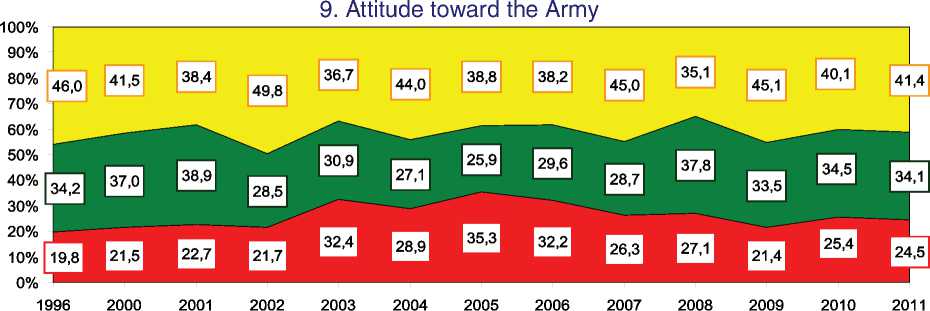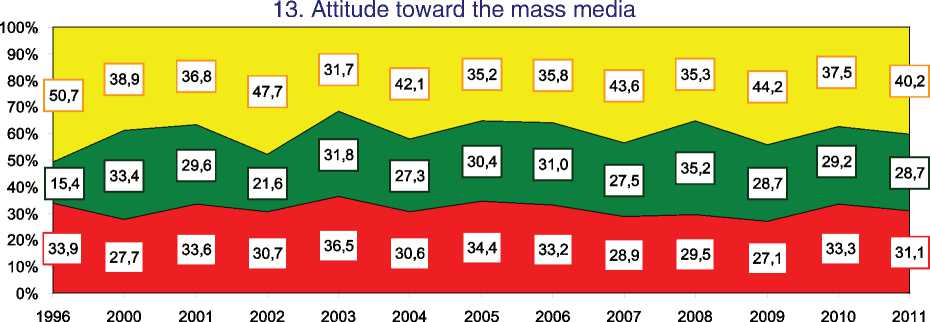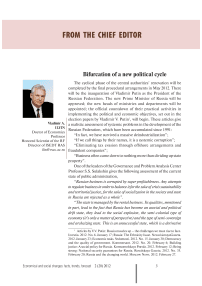Bifurcation of a new political cycle
Автор: Ilyin Vladimir Aleksandrovich
Журнал: Economic and Social Changes: Facts, Trends, Forecast @volnc-esc-en
Рубрика: From the chief editor
Статья в выпуске: 2 (20) т.5, 2012 года.
Бесплатный доступ
ID: 147223341 Короткий адрес: https://sciup.org/147223341
Текст ред. заметки Bifurcation of a new political cycle
The cyclical phase of the central authorities’ renovation will be completed by the final procedural arrangements in May 2012. There will be the inauguration of Vladimir Putin as the President of the Russian Federation 1 . The new Prime Minister of Russia will be approved; the new heads of ministries and departments will be appointed; the official countdown of their practical activities in implementing the political and economic objectives, set out in the election papers by Vladimir V. Putin 1 , will begin. These articles give a realistic assessment of systemic problems in the development of the Russian Federation, which have been accumulated since 1991:
“In fact, we have survived a massive deindustrialization”;
“If we call things by their names, it is a systemic corruption”;
“Eliminating tax evasion through offshore arrangements and fraudulent companies”;
“Business often came down to nothing more than dividing up state property”.
One of the leaders of the Governance and Problem Analysis Center Professor S.S. Sulakshin gives the following assessment of the current state of public administration,
“Russian business is corrupted by super profitableness. Any attempts to regulate business in order to balance it for the sake of crisis sustainability and territorial justice, for the sake of socialization in the society and state in Russia are rejected as a whole”.
“The state is managed by the rental business. Its qualities, mentioned in part, lead to the fact that Russia has become an asocial and political drift state, they lead to the social explosion, the semi-colonial type of economy (it’s only a matter of perspective) and the type of semi-sovereign and archaizing state. This is an unsuccessful state, which is a derivative of a certain quality of Russian business; its role is known here. In America Roosevelt used to break the backbone of this wild and independent business pretended to be the first in the system of state – society and state – business. Russia seems to be waiting for such a leader and a situation”2.
There is the only leader in the country now, who can do this. He is the newly elected President of the Russian Federation Vladimir V. Putin, who got the strong support of voters in the first round (63.6%), which was almost 3.5 times more than the support for the candidate ranked second.
This result is not accidental. Most of people take into account the undoubted positive aspects in the activity of V.V. Putin in the period of 2000 – 2008 – 2011. Most of electors also support the measures stated in V. Putin’s seven policy articles, which deal with the conceptual vision of the ways to solve the acute systemic problems, hampering the development of the country and threatening the country’s existence.
This is proved in details by the academician of RAS Sergey Glazyev 3 in the article “Why is Putin?”, which is published in our journal with the obliging permission of the author.
Will “new” V.V. Putin be able to lead himself to a new level of public administration? The answer is not obvious.
It was not clear before the election. Various groups had been trying to destroy the Putin-Medvedev tandem for four years of Dmitry Medvedev’s Presidency. There was an extraordinary destroying activity during the “orange” revolutions abroad in 2011.
Thus, there was a direct appeal to Dmitry A. Medvedev for the resignation of the Prime Minister Vladimir V. Putin.
“What will happen when Dmitri Medvedev due to some unknown reasons refuses to contest the presidency in 2012? It’s safe to assume that the fact of a refusal of the current president to continue his functions would cause large-scale crisis in the country”.
“There’s only one “little” thing left: Dmitry Medvedev has to venture out and cross his own personal Rubicon, turning directly to society to jointly undertake the difficult work of pulling the country out of the swamp into which we all fell in together. It is necessary to create the mechanisms for the partnerships of government and society in order to answer this call”.
“What would be very positive to emerge from this equal and impartial dialogue between Dmitry Medvedev and society would be the decentralization of the state, the ensuring of real freedom of the media (including the creation of Public Television), and the radical liberalization of the legislation on party building and non-profit organizations, and much more”4.
Here I would like to draw attention of our readers to the monograph “Power ideological transformation”, which was prepared in the Governance and Problem Analysis Center 5 . It deals with the typology and historic realizations of power transformation as a change in ideology and senior management of the state. The authors of this monograph give a historical assessment to the authors of such articles.
“The betrayal of the elites in the scenario of coming “orange revolution” is inevitable. There was no dismantlement of any regimes overthrown by the color revolutions without such kind of betrayal. Few years have passed since the mass re-swearing of local party bureaucratic elite to the anti-communist Boris Yeltsin instead of the general secretary Mikhail Gorbachev. So, even the member of the top brass, co-opted into the power on the base of personal loyalty, cannot be absolutely reliable in the current conditions.
Especially after their souls and thoughts are turned to the sense commercialization instead of service, they can be elementary overbought and reassigned to another person. This could not happen if there are ideological mechanisms of personnel selection”.
Our regular sociological measurements 6 of people trust to the main political and social public institutions during the period from 2000 to 2011 show that only the President was one of 16 institutions that was trusted by more than 50% of respondents (Vladimir V. Putin was trusted by the people from 57% in 2000 up to 60% in 2007; Dmitry A. Medvedev was trusted by the people from 65% in 2008 down to 50% in 2011).
Two institutions (church and govern-ment) were trusted by 42% in 2000 up to 47% in 2011.
Five institutions (the regional government, the court, the Federation Council, the Federal Security Service, the Procuracy) were trusted by 28 – 32% in 2000 up to 35 – 36% in 2011.
Four institutions (the army, the police, the State Duma and trade unions) were trusted by 23 – 37% in 2000 to 30 – 34% in 2011.
Another four institutions (mass media, political parties, CEOs, banking and business organizations) were trusted by 10 – 33% in 2000 to 20 – 28% in 2011.
There are more distrusters than trusters in the last group 7 .
Thereby, only three public institutions are trusted by 50% of respondents, and the rest thirteen institutions are trusted by 20 – 35% of the population. This is an alarm signal that indicates the possible de-legitimization of the state.
And many recent events such as the meetings on Bolotnaya Square and Sakharov’s Prospect, which were coordinated by the efforts of the people, who are dissatisfied with the Putin’s comeback as the President of the Russian Federation, confirm this danger.
The problems of power de-legitimization are on the agenda. According to S. Glazyev, “There is a question point-blank: who will win?” 8
Vladimir V. Putin, who had applied for the support to the people in the Luzhniki Stadium, received the support to the ideas of the final choice in favor of the interests of the country, social justice and national values against the interests of oligarchs and comprador elite, associated with the “sworn friends” of Russia.
But most of ordinary electors, who voted for V.V. Putin, are concerned about his ability to show the necessary political will to implement the nominated conceptual approaches to the development of the country for the next 10 years.
The article “The citizens have something to worry about” 9 by the well-known journalist Vladimir Tretyakov is devoted to the discussion on the article “The ways to prevent stealing the fruits of the victory” 10 by K. Zatulin, who argues that there is a treat to the victory of Vladimir Putin and his supporters to be emasculated or stolen.
V. Tretyakov isn’t surprised at such attempts, “There is a feeling that everything will go on forever. Sometimes it seems that Putin gives in to the pressure of a losing party. It seems that this text, like a magnifying glass, collects all the questions in the same focus. It is a focus of the choice that will or won’t be made by Putin in the coming weeks”.
There is not much time before the inauguration of the President of the Russian Federation on May 7, 2012.
What will Vladimir V. Putin choose?
-
1. Attitude toward the President of the Russian Federation*
100%
90%
!—-
—
80%
32,5
29,8
37,5
27,9
34,9
30,6
30,5
34,8
28,5
37,8
31,7
34,3
70%
55,7
60%
50%
40%
10,4
57,1
58,2
53,1
64,3
54,4
57,7
62,0
60,3
65,2
51,6
56,8
50,5
30%
20%
33,9
10%
10,4
12,0
9,4
7,8
10,7
11,7
7,5
4,9
6,3
10,6
11,5
15,2
1996
2000
2001
2002
2003
2004
2005
2006
2007
2008
2009
2010
2011
-
2. Attitude toward the Church
-
3. Attitude toward the Government of the Russian Federation
100%
,1
90%
80%
70%
45,4
39,1
39,4
47,9
33,6
44,5
37,8
36,5
41,3
29,4
39,7
33,2
36
60%
50%
40%
18,5
42,7
38,0
33,8
42,7
35,2
38,0
42,1
41,9
60,2
46,7
52,4
47,4
30%
20%
36,1
10%
18,2
22,6
18,3
23,7
20,3
24,2
21,4
16,8
10,4
13,6
14,4
16,5
0%
1996
2000
2001
2002
2003
2004
2005
2006
2007
2008
2009
2010
2011
-
4. Attitude toward the Government of the Vologda Oblast
5. Attitude toward the Court
6. Attitude toward the Federal Security Service of the Russian Federation

1996 2000 2001 2002 2003 2004 2005 2006 2007 2008 2009 2010 2011

■ Distrust
■ Trust □ Difficult to answer


7. Attitude toward the Federation Council of Russia

8. Attitude toward the Procuracy

D Distrust
D Trust
□ Difficult to answer

10. Attitude toward the Police

11. Attitude toward the State Duma

12. Attitude toward Trade Unions

D Distrust ряю □ Trust ряю □ Difficult to answer зетом

14. Attitude toward political parties and political movements

15. Attitude toward CEOs

16. Attitude toward banks and entrepreneurs

D Distrust
D Trust
□ Difficult to answer
The first ten articles according to the frequency of their viewing for the recent 12 months (April 2011 – March 2012)
|
5 |
го |
< |
11 го Л СП о ° го |
•^ Го го го 5 S' 2 го § Е го Е | S го = 03 |
1 Е >1 "го CD :— СП го £ 8 11 CD > |
со |
8 о о о S < с — го Ё Го О О G Ст ГО Го го а ел ^ |
8 S g б I В5 £5^1 > о § I го "а = 3 < □ 0 |
||
|
03 го оз ■= cc |
<с см |
от ° |
Е О. СМ СО |
Е О. СМ СО |
Е ^ О. см СО |
Е О. СМ СО |
||||
|
^ |
со |
СМ ^ |
со ^ |
СМ ^ |
||||||
|
о ^ о g | | *“ E 5 ст 03 ■—- (у C re CT S c § 8 о о |
со |
со |
ел |
со |
со |
от |
от |
от |
||
|
- и б ” 1 - 5 Е |
g |
от |
см |
н |
CD |
от |
сч |
сч |
от |
Г- |
|
- и “ Ё “ В ш с § > “ Е z см о т |
^2 |
сч |
oi |
со |
со |
от |
от |
я |
от |
от |
|
1 f i о Е 8 в = 2 > £ =■ о — |
^2 |
CD |
от |
от |
сч |
От |
н |
от |
||
|
ГО 03 О^ = о Ё В |
СО |
СО |
о |
со |
g |
От |
о |
От |
от |
|
|
оз ст 5 с с о 5 в 8 П см Но 1- |
ОТ |
со |
От |
g |
S |
от |
от |
от |
||
|
< |
, Е ей “ 2 CD Ё Е CD g cd | -го |
1 1 1 CD ГО 8 О го £ 2 |
Е ” ° ° ^ 5 ё 1 £ ^ о о о — ° о "^ Го го ^ ^ Е 8 |
О Е го ° .2 Е "го "го ° |
о Е •— | .Е | |
"ст Е Е | |
.Е 5 го а |
g g ст го Ё Ё Н Ё ОТ |
ъ _ Iq g ГО ст Ё "8 "О m 8 |
|
|
бицеу |
1- |
сч |
СО |
го- |
от |
СО |
г- |
со |
ел |
CD |
Account of the site’s viewing has been carried out since 2009, December, 12.
Список литературы Bifurcation of a new political cycle
- Putin V.V. Russia muscles up -the challenges we must rise to face. Izvestia. 2012. No. 6. January 17
- Putin V.V. Russia: The Ethnicity Issue. NezavisimayaGazeta. 2012. January 23
- Putin V.V. Economic tasks. Vedomosti. 2012. No. 15. January 30
- Putin V.V. Democracy and the quality of government. Kommersant. 2012. No. 20. February 6
- Putin V.V. Building justice: A social policy for Russia. Komsomolskaya Pravda. 2012. February 12
- Putin V.V. Being strong: National security guarantees for Russia. Rossiiskaya Gazeta. 2012. No. 35. February 20
- Putin V.V. Russia and the changing world. Moscow News. 2012. February 27.
- The quality of Russian business as a factor of unsuccessful Russian state. The materials of Science Seminar. Moscow: Science Expert, 2011. Vol. 7 (45).
- Glazyev S. Why is Putin? Zavtra. 2012. February -March 9.
- JurgensI., GontmakherЕ.The President shall declare himself. Vedomosti.2011.July27.
- Bagdasaryan V.E., Sulakshin S.S. Power ideological transformation: Historic experience and typology. Ed. by V.I. Yakunin. Moscow: Science Expert, 2011.
- Zatulin K. The ways to prevent stealing the fruits of the victory. Moskovsky Komsomolets. 2012. March 22


